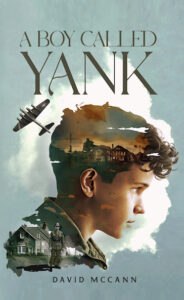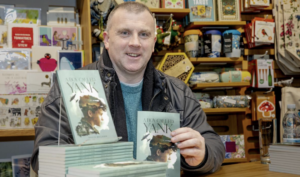David McCann, 51, is an author, filmmaker and amateur historian whose books include the coming-of-age novel A Boy Called Yank. Born and raised in Northern Ireland, he lives in the Ulster town of Enniskillen where the controversial Irish playwright Oscar Wilde went to school and the IRA carried out their infamous Remembrance Sunday attack.
How would you describe yourself: as an amateur historian, a novelist, or a filmmaker?
It’s a tough question because I have many interests. Primarily, I would consider myself an amateur historian, and that passion has naturally led me to pursue both book writing and filmmaking.
When did you develop an interest in history and storytelling through writing or filmmaking?
My interest in history was sparked in primary school, particularly by the American Civil War. I’ve always had a fascination with history, though I can’t pinpoint exactly why. Back then, I was captivated by the stories of the Union and Confederates, spending countless hours reading about them. Our local library was a fantastic resource, offering a wealth of historical books that inspired me further. Additionally, living through the Troubles at that time added a unique layer to my understanding of history, though I didn’t fully grasp its significance as it unfolded around me.
So you grew up during the Troubles in Northern Ireland?
Yes, I was born in 1972, which was the worst year of the Troubles. I lived through a war zone for about 25 to 30 years.
Despite this, you chose to direct your creativity toward other periods in Northern Ireland’s recent history, such as the 1920s and 1940s.
I’m not certain it was a conscious decision; perhaps I subconsciously want to forget the seventies and eighties. There are already plenty of books and films about that period. Instead, my natural curiosity leads me to explore earlier times.
Set in 1943 Enniskillen, your novel A Boy Called Yank follows Conor Cleary, a boy whose life is transformed by the arrival of American troops stationed in the town to aid the Allies in their fight against Nazi Germany during World War II. What inspired your interest in Enniskillen during this pivotal time in history?
My grandfather lived in Enniskillen during that time, and when I was a child in the 1970s, he would share captivating stories with me. This sparked my interest, prompting me to research the presence of troops in the town back then. I realised there was a compelling tale to be told, especially since my grandfather recounted some unique events he witnessed one night in town. This inspired me to incorporate those experiences into a fictional narrative.
Tell us about your latest film project.
It’s called The Green Fella and focuses on the Royal Irish Constabulary, with the main character being Sergeant Collins. This film is the fourth and final instalment exploring the partition of Ireland in the 1920s. We plan to film around Tyrone and Monaghan, hopefully in February and March this year, and we have access to several beautiful rural locations that evoke the 1920s.
This historical period serves as the backdrop for the Troubles, during which the Royal Irish Constabulary was the police force in what was then a united country. In 1921, however, it was partitioned into two states: the Irish Free State and Northern Ireland.
What do you find more challenging: writing a novel or filmmaking?
I find filmmaking to be significantly more demanding due to its logistical complexities and the challenges of scriptwriting. When I’m writing a story or a book, I can retreat to a comfortable space, immerse myself in music from that era, and read or watch documentaries to enhance my creativity. It becomes an enjoyable process.
In contrast, filmmaking involves a lot of running around—searching for locations, coordinating with cameramen, actors, extras, and crew. Additionally, writing a script proves to be quite challenging for me. I believe I’m better at crafting stories for books than scripts. In fact, for this fourth film, which will be 50 minutes long, I currently have a professional scriptwriter assisting with the script.
How long did it take to write A Boy Called Yank?
Since it’s a relatively short story, the actual writing process took about four to five months.
I had gathered the entire narrative from various people around the town, many of whom had connections to the American Army. It was a rich and compelling story drawn from real life, influenced by accounts from my grandfather and others. Their stories always resonated with me, making it clear that they needed to be captured on paper.
While some elements are based on true events, there are also fictional ideas woven in from my perspective. For instance, I included General Patton in the story; although he was in town, I crafted a narrative that linked his time there with the fictional boy and the soldier I created.
What else is happening for you in 2025?
Apart from filming The Green Fella, we are discussing plans to relaunch A Boy Called Yank in the U.S. and Canada. This includes the possibility of a film adaptation and the development of a prequel.

An exploration of friendship and adventure. An unforgettable coming-of-age story of small-town adolescence and universal experience.
Thirteen-year-old Conor Cleary lives with his mother in a cottage in County Fermanagh, Northern Ireland. With little contact with the outside world and nothing much to do, life is uneventful. Until one day the United States Army are posted in Fermanagh on their way to fight in mainland Europe during the Second World War, and Conor’s life changes forever.

DAVID MCCANN is a film maker and producer of two short films set in 1920s Ireland titled Sgt Collins RIC & The Green Fella. He has worked as a hospital porter and an Irish Police Officer in the Garda Reserve. He lives in Enniskillen, Northern Ireland.